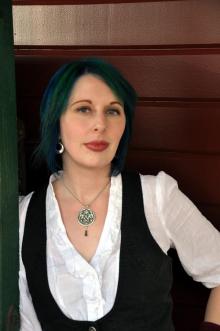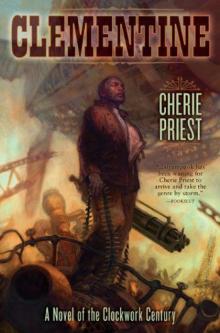- Home
- Cherie Priest
Ganymede (Clockwork Century) Page 12
Ganymede (Clockwork Century) Read online
Page 12
“This place is a wreck!” the kid declared. “Is it always like this?”
“No, they’ve had a storm,” the captain told him again. The subject had already come up while they were overhead, surveying the damage in advance of landing.
“But everything is so dry!”
“That’s why they call them windstorms. Or … dust storms. But they’re common out here. No trees, you see. No grass, no plants with roots to hold on to the soil. No mountains to break up the sky and give the weather something to work around.”
“It’s hot as hell.”
A straggling gust of warm, dusty air smacked them in the face and dragged itself past them, tugging at their clothes and coiling off into tiny dust devils behind them. The captain pulled his goggles down off his head and fixed them over his eyes to keep out the next batch of blown debris, and he said, “You think this is hot? Wait until we get to the Gulf.”
“It’s even worse?”
“It’s just as bad. It’s wet, and the river runs through it—so there aren’t just trees but swamps, and grasses that grow out of the water as tall as me. Moss hangs off every branch of every tree, and everything is green and overgrown. Everything lives there. Giant trees that look like they’re melting. Animals like you’ve only heard about in books.” An almost wistful look crossed his face, but he put it down quickly by recalling, “You’ll sweat through everything you’re wearing. It’s like you never dry off, not really.”
The boy’s enthusiasm flagged, but quickly buoyed back up again. “Can we swim in the river? That’d be a good way to cool off.”
“I wouldn’t recommend it, not unless you want to get bitten by snakes, or eaten by alligators.”
“Hm,” Houjin said, chewing this over as they strolled past a dog crawling out from under a saloon’s porch. The animal sneezed and shook itself, then wandered away. “And you used to live there?”
“I didn’t … I didn’t live there. Not exactly. I just spent a lot of time there.”
“Why?”
“You sure are full of questions today.”
“Kirby says I’m always full of questions.”
“Kirby’s right.”
“Where are we going?”
“Over there. Train station.”
“Why? We don’t need a train.”
“No,” the captain agreed. “But we need a telegraph operator, and that’s where towns usually keep them.”
“Why?”
“Because the people who run the trains need to know who’s coming and going. And they need to know the weather and all,” he said vaguely. “And passengers do, too. They like to send notes to their friends and families, if they’re traveling a real long way. Remember how Nurse Lynch was sending dispatches from the road—when she was on her way from Virginia?”
“I remember.”
“Well, there you go.”
“Where are you sending a telegram?”
“To New Orleans—to the lady who wants us to take a job,” Cly said, preemptively answering the next thing poised to fly out of Houjin’s mouth. Speculating on the third thing the kid had on deck, he added, “I tried to drop a wire from Portland, but there was some kind of problem with the poles, they said. And I forgot in Boise, and the office had closed by the time we made it to Denver. Now we’re only a thousand miles out, and I’ve dillydallied about letting the lady know we’re coming. So I’m doing it now.”
“Oh.”
Andan Cly had bought himself a few yards of silence, enough to reach the wood plank walkway of the train station, and to hike the last few feet to the sign that announced WESTERN UNION. He ducked the sign but still managed to clip it with the edge of his head, sending it swinging on its chains. Upon entering the small office, he swiped his goggles off his face and let them hang around his neck.
“Hello,” greeted a tiny, chipper woman with enough highly coiffed black hair to weave a blanket. It was difficult to escape the impression that she’d chosen the style with the specific intent of appearing larger. “What can I do for you, sir?”
Houjin slipped into the office behind the captain, and the woman gave him a puzzled look, but didn’t address him.
“I need to send a telegram. To a … boarding house. In New Orleans.”
“Very good, sir. Our rates are as posted.” She pointed at a sign that noted the charge by the line.
He said, “That’s fine.” He withdrew a square of scratch paper from his back pocket and unfolded it to reveal a message, addressed to Josephine Early at the Garden Court Boarding House on the Rue Dumaine. It had been distilled down to its essence, with all the important parts preserved, but not a drop of sentiment to be detected.
WILL TAKE THE JOB. INCOMING APPROX. APRIL 16. STOPPING AT BB FIRST, THEN INTO TOWN TO TEXIAN DOCK/MACHINE WORKS. SEE YOU THEN. AC.
The operator examined the message and flipped through her listings of New Orleans connections, then hesitated. “Can I ask you something—is ‘BB’ short for Barataria Bay?”
Cly replied, “Sure, that’s where I’m going first. Got to pick up a few things.”
“Ooh,” she exclaimed. And in a low, conspiratorial tone, she added, “I suppose I ought to pass along a little warning to you, then, in the spirit of friendliness.” The operator leaned forward and crossed her arms, the veritable picture of a woman who was thrilled by the opportunity to gossip with a real live person, and not a faceless set of dots and dashes over the taps. “You know how Texas occupies the city, don’t you?”
Cly nodded. “Sure, I know.”
She lowered her voice even further, as if anyone but Houjin were within overhearing range. “All right, then. Something happened to a couple of officers down there—something that no one wants to talk about. They disappeared or died, that’s my guess. Anyhow,” she continued, “a new officer went in to replace the colonel a couple of days ago. And the first thing he does when he takes post … oh, Lordy. Just guess!”
“I’m a terrible guesser. Just tell me.”
“Well!” she went on, downright breathless. “First thing he does is, he comes down on the bay with a full brigade of soldiers, and they wipe Barataria clean off the earth!”
Stunned, the captain exclaimed, “You can’t be serious!”
She settled back and leaned in her chair. “I don’t know how bad the damage is, ’cause I ain’t seen it in person, you know. But it’s all anyone’s been talking about on the lines. And if you don’t mind my bringing it up, a lot of the men like yourself who are passing through … they’re the kind to stop by the bay, if they’re headed that far south.”
“I don’t mind,” he all but mumbled, but not because her observation bothered him. He pressed for more. “But surely the bay’s not … I mean, it wasn’t destroyed? It’s been … what it is … for seventy years or more. It’s practically an institution! And Texas hadn’t bothered it yet, occupation or none.” The great pirate Jean Lafitte had established the bay as his own personal kingdom, back in 1810 or thereabouts. It’d come and gone, changed hands, changed allegiances, and changed flags with the rest of Louisiana … but it’d always been held by pirates. Lafitte’s sons, after he’d died. And after them, his grandchildren.
She sighed heavily and shook her head with great drama. “I’m sure I couldn’t say, sir. All I know is that the new man made it his mission to stomp the place flat, and he got his plan under way just the other night. I don’t know if there’s anything left standing but the fort, and I’m none too sure about that.”
“Captain?” Houjin started to ask something, but Cly waved him into silence.
“Now, how much of what you’re telling me is gossip, and how much do you know for sure?” he asked the small woman with the big hair.
“I told you, I haven’t seen it myself. But I’ve heard the story from more than one tapper along the lines, so there’s some truth to it. You’d best be careful, if you’re thinking of docking down that way. Or skip it altogether, that’s my advice.”
“Than
k you,” he said to her, and he reached for his money. “I might skip it, like you said. There’s nothing over there that’s so important I can’t pick it up someplace else.”
He paid for his telegram and ushered Houjin out of the office, back into the street, before the boy could unleash his insatiable questioning upon the woman. It worked, but that meant Cly had to answer all the questions himself.
“Do you think she’s right? Do you think the docks are all gone? I wanted to see the pirate bay.”
“I don’t know if she’s right. I don’t know if the docks are all gone. And I wanted to see it, too, for the rum and absinthe moves cheaper over there—without the city, the state, and the Confederacy all taking their taxes on it. Now I’m not so sure.”
“Are we going to stop there anyway?”
“Let me think about it.”
Back at the docks, the excavation and return to order were under way, and Fang was helping someone beneath an overhang. His head and hands were buried under a tank, and two other men were bracing it up on a set of jacks. One of them turned to Cly and said, “Lines are all clogged up, but we’re clearing them out now. We’ll have these ready to start fueling again in a few minutes.”
“Thanks, Fred,” Cly told him.
“You know these guys?” Houjin pounced into the conversation.
“Sure. That’s Fred Evans, and underneath with Fang—that’s Dale Winter, isn’t it?”
From under the tank, someone called, “Cly, that you?”
“Yeah, it’s me.”
“What are these tanks for? Is this where you make the hydrogen? How do you do it? How did the lines get clogged? Do sandstorms always do this? Do—”
“And who’s this?” Fred Evans looked quizzically at the boy.
Cly sighed. “This is Houjin. Call him Huey if that’s easier. He’s learning to fly with us, and this is his first big trip away from home.”
“You’re a more patient man than I am.”
“Not sure if that’s true or not,” the captain said. “Is there anything I can do to help? We need to hit the sky.”
“Not much. I think they’ve got the bottom tubes just about cleaned, ain’t that right, fellas?”
Dale Winter said, “Uh-huh,” and Fang flashed a thumbs-up sign from under the crate.
“Then I suppose I’ll get out of your way. And I’ll take him with me,” Cly said with a nod at Houjin.
“But I want to stay and watch—I’ve never seen the hydrogen generated before, and I might need to know someday. I especially might need to know if we’re going to start a generator of our own, back home,” he pointed out.
The captain didn’t want to admit that the kid was right, but before he had to, Fred said, “Don’t worry about it, Cly. He can stay, and he can ask questions. You thinking about setting up a dock for yourself?”
“Back in Seattle, one of these days. Maybe soon.”
“Seattle? That backwater? I didn’t know anybody lived there anymore.”
“You’d be surprised. And I’ve been talking to the … uh … well, he’s kind of like the mayor,” Cly exaggerated. “We’re thinking a hydrogen dock would be a good thing for the town.”
“Would you be running it?”
“I think so, yes.”
Fred nodded thoughtfully. “Not a bad way for a man to retire. The work’s not so hard, and I guess out there up north, you don’t have these god-awful dust storms to worry about.”
“No, no dust storms.”
Cly retreated to the Naamah Darling, leaving Houjin to learn about the system. Though the lad had never undergone any formal education, he was smarter than almost anyone the captain had ever known—a boy with an easy mastery of everything with gears, levers, valves, wires, or bolts … to say nothing of his flair for languages.
Fang understood Portuguese, English, and both Mandarin and Cantonese—but he couldn’t speak any of them, and most of his communication with others came in the form of hand signs or written notes. Cly himself knew a smattering of French, left over from his days lurking about New Orleans, and he could not read or write Mandarin, but he spoke enough to make himself understood … if the other speaker were very, very patient. Otherwise, he was limited to the English he’d learned from the cradle onward, and it was sometimes insufficient.
But Huey had a brain like a sponge.
Born to speak Mandarin, he’d picked up Cantonese alongside it and learned English from Lucy O’Gunning and some of the older white men who lingered in the underground. As soon as he could read the English, he’d demanded books composed therein, and before long, he’d developed a better vocabulary than any of the native English speakers the captain knew. Now Fang was teaching him Portuguese out of a few novels, and lately Huey had shown some interest in Spanish.
In short, the Chinese boy could read, write, and speak almost everything useful. And he was busy learning what he didn’t already have a handle on.
The captain himself had only a fourth-grade education, and he was occasionally intimidated by the well-read, the well-heeled, and the well-to-do. However, he was not at all stupid, and he was quietly thrilled by the idea of grooming someone like Houjin for his crew and company. Andan Cly had been a pirate so long, he didn’t care that the boy wasn’t educated, or of age, or even white. He’d learned the hard way that you take the best crew members for the job, regardless of the particulars, and if the best man for the job of engineer was a teenage boy with a ponytail, so be it.
Technically, Kirby Troost was the ship’s engineer. And technically, Cly called Houjin his “communications officer.” But realistically, everyone on board performed whatever task was needed, and the duties were fluid.
Kirby Troost was sitting outside the bobbing hull of the Naamah Darling, still clamped to its pipe dock and awaiting a Goodyear tube of gas. “Cap’n,” he greeted him with a nod of his head.
“Kirby. You got any business that needs attending, while we’re here?”
“Already attended to it. And I’ve got a bit of bad news. There’s trouble at Barataria, sir. Texas stomped through it a couple nights ago.”
“Oh, good,” Cly said. Then, quickly, he adjusted the sentiment. “I mean, your bad news is the same as my bad news, so between the two of us, there’s just one parcel of it.”
“Ah. Right you are, sir. And it could be worse. We could’ve been there when the Texians put their boots on the ground.”
“You’re right about that. Say, how’d you hear about it?”
“Begging your pardon?”
The captain said, “I only learned it through the tapper girl. You got a source out here moves faster than the wires?”
“No, sir. Ran into some old acquaintances, that’s all. They flew over Barataria the day before yesterday, and thought to tell me about it. What did the tapper girl tell you?”
Old acquaintances … that could mean anything, but the captain didn’t press for more. “She said she’d heard lots of rumors, but nothing firm. What’d your acquaintances have to say about it?”
“Only that it happened, and the surviving bay boys are digging themselves out as best they can. Texas didn’t get everybody—a bunch of the brighter fellows holed up in the old Spanish fort, and rode it out that way. But the place has been done a real blow. It’s a shame.” Kirby shook his head. “There ought to be some kind of exemption, for someplace with such a long and colorful history.”
“You think they ought to leave it alone, just because it’s been there awhile?”
“Something like that. Mostly I want to get liquor without paying taxes six ways from Sunday, but a man can’t have everything like he wants it. But I won’t lie to you, Captain. It smells funny to me. Word in the clouds has it, Texas was looking for someone in particular, or something. Nobody knows what. Or if anybody does, nobody’s talking.”
If no one was talking to Kirby Troost, it must be a secret piece of information indeed.
Andan Cly sat down on the ship’s steps, which were unlatched and
dangling down. His sudden weight made the stairs sway, until they settled against the ground beneath him.
Troost sat beside him. He pulled out a canteen and took a swig of something that wasn’t water, and he asked, “Our business wasn’t with the bay, though, was it?”
“Nope. We’re running for the city, and I’m going to swing by the Vieux Carré to … help out an old friend.”
“An old friend?”
“She wants me to make a short trip for her.”
“She does, does she? I don’t guess you have any more details than that.”
Cly shook his head. “I’m sure it’ll be fine. It should be real quick.”
“We flying Miss Naamah?”
“I don’t think so. But when I do know, I’ll pass it on. Until then, don’t worry about it.”
Kirby took another swig. “All right, then. I won’t.”
And back into the sky they went, into the currents and clouds that would take them the rest of the way south, the rest of the way to the Gulf.
Seven
The blower was a flat-bottom boat that sat high on top of the water, like a very small barge. Barely big enough to hold all three passengers without dipping below the rippling waterline, the craft shuddered until everyone sat very still. Behind them, a large diesel-powered fan loomed like a tombstone.
No one said anything until Josephine stated the obvious. “We’ll need something bigger to bring Deaderick out, won’t we?”
Ruthie shivered and drew her jacket closer around her shoulders, but said, “To be sure, but we can find something bigger on the island, non?”
“Sure,” Gifford agreed. “We’ll find something.”
“Something that still floats, or still flies,” Josephine muttered. “They can’t have grounded or sunk everything.”

 Maplecroft
Maplecroft Chapelwood
Chapelwood Fathom
Fathom Hellbent
Hellbent Jacaranda
Jacaranda Four and Twenty Blackbirds
Four and Twenty Blackbirds Dreadnought
Dreadnought Dreadful Skin
Dreadful Skin Bloodshot
Bloodshot Tanglefoot
Tanglefoot Clementine
Clementine Ganymede
Ganymede The Inexplicables
The Inexplicables Not Flesh Nor Feathers
Not Flesh Nor Feathers Wings to the Kingdom
Wings to the Kingdom Fiddlehead
Fiddlehead Tanglefoot: A Story of the Clockwork Century
Tanglefoot: A Story of the Clockwork Century The Agony House
The Agony House Ganymede (Clockwork Century)
Ganymede (Clockwork Century) The Inexplicables (Clockwork Century)
The Inexplicables (Clockwork Century) Clementine tcc-2
Clementine tcc-2 Grants Pass
Grants Pass Dreadnought tcc-3
Dreadnought tcc-3 Ganymede tcc-4
Ganymede tcc-4